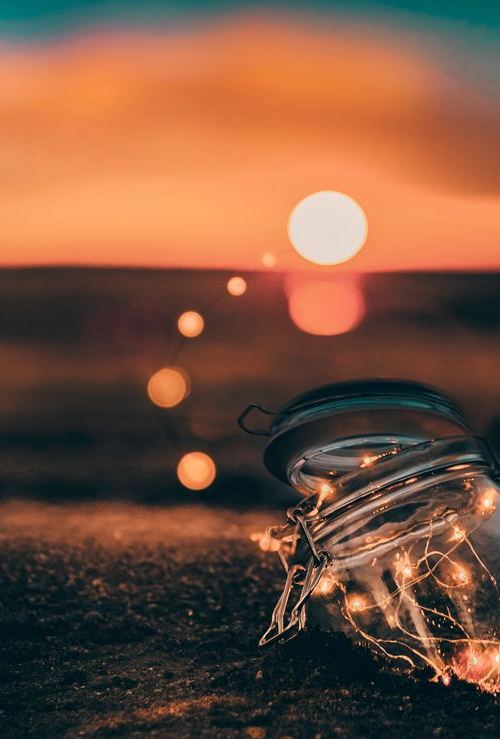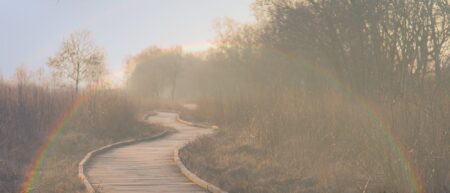“Why do people turn to poetry in tumultuous times?” is one of the most common questions I’ve been asked about my poem “Good Bones” over the past year. Why poems? Why now? I think poems can help us articulate what we may be struggling to put into words.
Engaging with a poem, whether as a writer or as a reader, requires us to slow down, pay attention, and be open and alert.
Here I’ve compiled a few of my favorite poems that I find myself turning to again and again—poems that acknowledge darkness but choose light.
1. Ross Gay, “Sorrow Is Not My Name”
I know I’m not alone in thinking of Ross Gay as the Poet Laureate of Hope and Joy—and I mean hope and joy as defiance, as tenacity, and as resistance. I mean hope and joy as a hard choice we can make against the pull of cynicism. In “Sorrow Is Not My Name,” from Bringing the Shovel Down, Gay writes, “there are, on this planet alone, something like two/ million naturally occurring sweet things,/ some with names so generous as to kick/ the steel from my knees.” Here’s to the sweet things: the ones Gay names in the poem, and the ones he inspires us to conjure in our own minds.
2. Adam Zagajewski, “Try to Praise the Mutilated World” (translated by Clare Cavanagh)
This poem has become a kind of anthem for finding light in darkness. The tenacity is enacted in the poem’s rhetoric, with the repetition of the first line and its variations. The poem begins with “Try to praise the mutilated world.” Later in the poem, that line shifts to “You must praise…,” “You should praise…,” and finally, simply “Praise the mutilated world.” The image the poem lands on is a metaphor for hope—“the gentle light that strays and vanishes/ and returns.”
3. W.S. Merwin, “Thanks”
I think of Merwin’s “Thanks” as a good companion for Zagajewski’s “Try to Praise the Mutilated World.” The two have enough in common to be friendly, both in their thematic concerns and their use of repetition. The closing of Merwin’s “Thanks” is a kind of foil; it lands on darkness, but emphasizes that the action—giving thanks, waving—is happening despite the darkness:
“we are saying thank you faster and faster
with nobody listening we are saying thank you
thank you we are saying and waving
dark though it is”
4. Robert Hass, “Meditation at Lagunitas”
One of the ways we can love the world is by paying attention, and Robert Hass pays attention. I remember encountering this poem for the first time in college, and being taken in by its combination of macro and micro. The poem famously begins in shadow (“All the new thinking in about loss./ In this it resembles all the old thinking.”) But it ends with hope, and the most delicious repetition:
“There are moments when the body is as numinous
as words, days that are the good flesh continuing.
Such tenderness, those afternoons and evenings,
saying blackberry, blackberry, blackberry.”
5. Marie Howe, “What the Living Do”
I find something new every time I read “What the Living Do.” This poem seems at home with contrast: mourning and deep joy, loss and discovery. It’s an elegy that talks about Drano, after all. Reading it often brings me to tears. It’s a poem of the good hurt, by which I mean the kind of poem that simultaneously wounds and heals. That is what poetry can do.
***
In June I tweeted a request: Poems that bring you joy? Make you glad to be alive?
Just seeing the number of responses, in the long thread that grew and grew, brought me joy. I’m particularly grateful to Michael Wright, who was kind enough to compile all of the individual poems into this list. I hope you find at least one poem here that feels true and important, even necessary, to you.
“Because These Failures Are My Job,” Alison Luterman
“The Orange,” Wendy Cope
“Good Bones,” Maggie Smith
“Thanks,” W. S. Merwin
“Oh the places you’ll go!” Dr. Seuss
“From Blossoms,” Li-Young Lee
“Song,” Brigit Pegeen Kelly
“Allegro,” Tomas Tranströmer
“Brief Pause in the Organ Recital,” Tomas Tranströmer
“Late Fragment,” Raymond Carver
“The Old Astronomer to His Pupil Tyco Brahe,” Sarah Williams
“Village,” Alice Oswald
“love is a place,” e. e. cummings
“When I Have Fears,” John Keats
“Ozymandias,” Percy Bysshe Shelley
“Drinking While Driving,” Raymond Carver
“Fulbright Scholars,” Ted Hughes
“Having a Coke with You,” Frank O’Hara
“Ode to Walt Whitman,” Federico García Lorca
“Otherwise,” Jane Kenyon
“Man Eating,” Jane Kenyon
“After the Party Pantoum,” Rachel Kessler
“A Ritual to Read Each Other,” William Stafford
“Celestial Music,” Louise Glück
“How To Triumph Like a Girl,” Ada Limón
“What the Living Do,” Marie Howe
“Most Days I Want to Live,” Gabrielle Calvocoressi
“i am running into a new year,” Lucille Clifton
“Wild Geese,” Mary Oliver
“Microchimerism,” Heid Erdrich
“Defending Walt Whitman,” Sherman Alexie
“Advice to Myself,” Louise Erdrich
“As Kingfishers Catch Fire,” Gerard Manley Hopkins
“Bottom of the Ocean,” Bob Hicok
“who are you, little i,” e. e. cummings
“i thank you god for most this amazing day,” e. e. cummings
“Islands,” Muriel Rukeyser
“The Conjugation of the Paramecium,” Muriel Rukeyser
“We Real Cool,” Gwendolyn Brooks
“The Fish,” Elizabeth Bishop
“An Introduction to Some Poems,” William Stafford
“i carry your heart,” e. e. cummings
“Those Graves in Rome,” Larry Levis
“On Wanting to Tell [ ] about a Girl Eating Fish Eyes,” Mary Syzbist
“Why I Wake Early,” Mary Oliver
“Let Evening Come,” Jane Kenyon
“Te Deum,” Charles Reznikoff
“You Can’t Have it All,” Barbara Ras
“The New Colossus,” Emma Lazarus
“Today,” Frank O’Hara
“The Cats of Firaz are Starving,” Von Thompson
“For All,” Gary Snyder
“Filling Station,” Elizabeth Bishop
“Eating Fried Chicken,” Linh Dinh
“Praise Song For The Day,” Elizabeth Alexander
“Ithaca,” C. P. Cavafy
“Love Calls Us to the Things of This World,” Richard Wilbur
“Happiness was hiding in the last tear,” Galway Kinnell
“A Blessing,” James Wright
“Meanwhile,” Richard Siken
“Little Sleep’s-Head Sprouting Hair in the Moonlight,” Galway Kinnell
“Swimming in the Rain,” Chana Bloch
“April 3” and “May 20,” Julie Fogliano
“Crusoe in England,” Elizabeth Bishop
“Desire,” Stephen Dunn
“An Indian To His Love,” W. B. Yeats
“Advice to My Son,” Peter Meinke
“Basket of Figs,” Ellen Bass
“Different Ways to Pray,” Naomi Shihab Nye
“Commission,” Ezra Pound
“When Lorelai broke the curtain rail,” Amanda Kennedy
“Torn,” C. Dale Young
“The Windhover,” Gerard Manley Hopkins
“Midsummer XXVIII,” Derek Walcott
“In The Waiting Room,” Elizabeth Bishop
“Gift (Dar),” Czeslaw Milosz
“Questions for Miriam,” Warsan Shire
“I Was Minor,” Olena Kalytiak Davis
“In a Light of Other Lives,” Denis Johnson
“Steps,” Frank O’Hara
“The Kingfisher,” Mary Oliver
“Album (excerpt),” Greg Pape
“The Stags,” Kathleen Jamie
“Bees of Eleusis,” Franz Wright
“One Boy Told Me,” Naomi Shihab Nye
“Danse Russe,” William Carlos Williams
“Faint Music,” Robert Hass
“Small Comfort,” Katha Politt
“Meditations in an Emergency,” Frank O’Hara
“Ode to the Perineum,” Steve Scafidi
“In Service of Staying Alive,” Lynne Procope
“Catalog of Unabashed Gratitude,” Ross Gay
“Kingdom Animalia,” Aracelis Girmay
“An Atlas of the Difficult World, XIII (Dedications),” Adrienne Rich
 MAGGIE SMITH’s most recent collections are Good Bones, forthcoming in fall 2017 from Tupelo Press, and The Well Speaks of Its Own Poison, winner of the Dorset Prize. Her poems have recently appeared or are forthcoming in The New York Times, Best American Poetry 2017, APR, Ploughshares, AGNI, and elsewhere. The recipient of fellowships from the NEA, the Ohio Arts Council, and the Sustainable Arts Foundation, Smith lives and writes in Ohio.
MAGGIE SMITH’s most recent collections are Good Bones, forthcoming in fall 2017 from Tupelo Press, and The Well Speaks of Its Own Poison, winner of the Dorset Prize. Her poems have recently appeared or are forthcoming in The New York Times, Best American Poetry 2017, APR, Ploughshares, AGNI, and elsewhere. The recipient of fellowships from the NEA, the Ohio Arts Council, and the Sustainable Arts Foundation, Smith lives and writes in Ohio.



